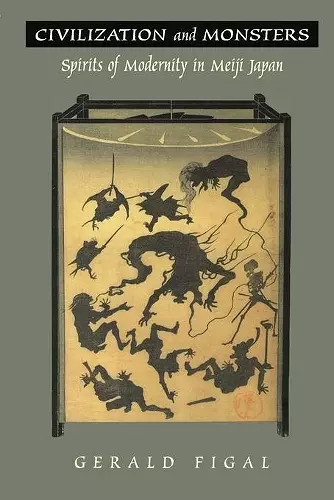Civilization and Monsters
Spirits of Modernity in Meiji Japan
Format:Paperback
Publisher:Duke University Press
Should be back in stock very soon

Asserts that a discourse on the fantastic was at the heart of the historical configuration of Japanese modernity and that the fantastic is the constant condition of Japanese modernity.
Monsters, ghosts, the supernatural, the fantastic, the mysterious. This title asserts that discourse on the fantastic was at the heart of the historical configuration of Japanese modernity - that the representation of the magical and mysterious played an integral part in the production of modernity beginning in Meiji Japan (1868-1912).Monsters, ghosts, the supernatural, the fantastic, the mysterious. These are not usually considered the “stuff” of modernism. More often they are regarded as inconsequential to the study of the modern, or, at best, seen as representative of traditional beliefs that are overcome and left behind in the transformation toward modernity. In Civilization and Monsters Gerald Figal asserts that discourse on the fantastic was at the heart of the historical configuration of Japanese modernity—that the representation of the magical and mysterious played an integral part in the production of modernity beginning in Meiji Japan (1868–1912).
After discussing the role of the fantastic in everyday Japan at the eve of the Meiji period, Figal draws new connections between folklorists, writers, educators, state ideologues, and policymakers, all of whom crossed paths in a contest over supernatural terrain. He shows the ways in which a determined Meiji state was engaged in a battle to suppress, denigrate, manipulate, or reincorporate folk belief as part of an effort toward the consolidation of a modern national culture. Modern medicine and education, functioning as a means for the state to exercise its power, redefined folk practices as a source of evil. Diverse local spirits were supplanted by a new Japanese Spirit, embodied by the newly constituted emperor, the supernatural source of the nation’s strength. The monsters of folklore were identified, catalogued, and characterized according to a new regime of modern reason. But whether engaged to support state power and forge a national citizenry or to critique the arbitrary nature of that power, the fantastic, as Figal maintains, is the constant condition of Japanese modernity in all its contradictions. Furthermore, he argues, modernity in general is born of fantasy in ways that have scarcely been recognized.
Bringing unexplored and provocative new ideas to the Japan specialist, Civilization and Monsters will also appeal to readers concerned with issues of modernity in general.
“Gerald Figal’s powerful study persuades us that superstition, monsters, and the fantastic are at the very heart of Japanese modernity—an argument conveyed in splendid fashion. This is an exciting, fresh, and aptly provocative work.”—James Fujii, University of California at Irvine
“Through the transmutation of ghosts, Figal brings out one of the central problematics of modern nation-states: what to do about pasts that are simultaneously evidence of backwardness and integral to the make-up of the nation. All scholars interested in Japan, historically and culturally, should read Civilization and Monsters.”—Stefan Tanaka, University of California, San Diego
ISBN: 9780822324188
Dimensions: unknown
Weight: 431g
304 pages